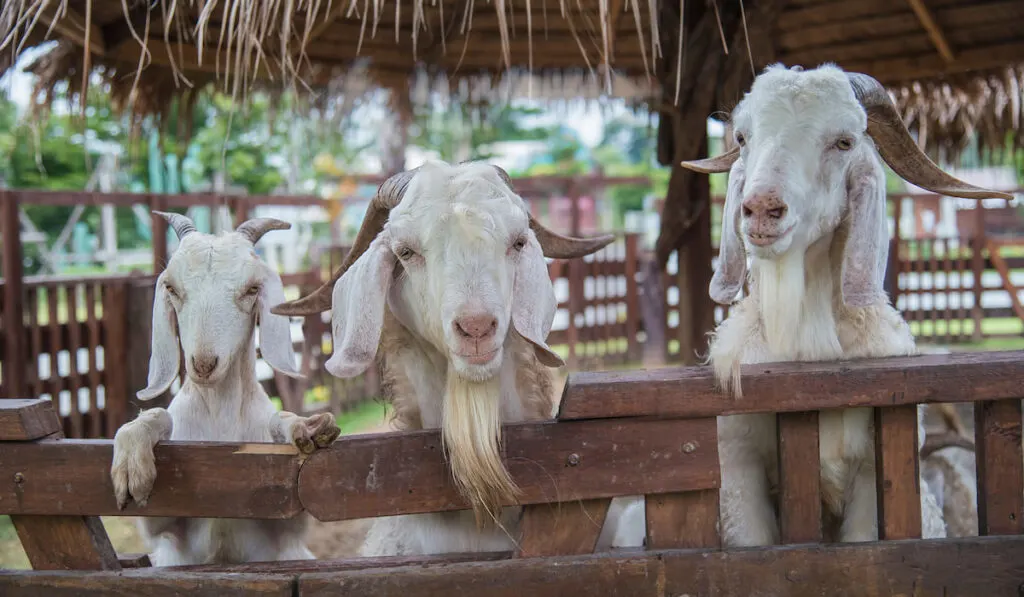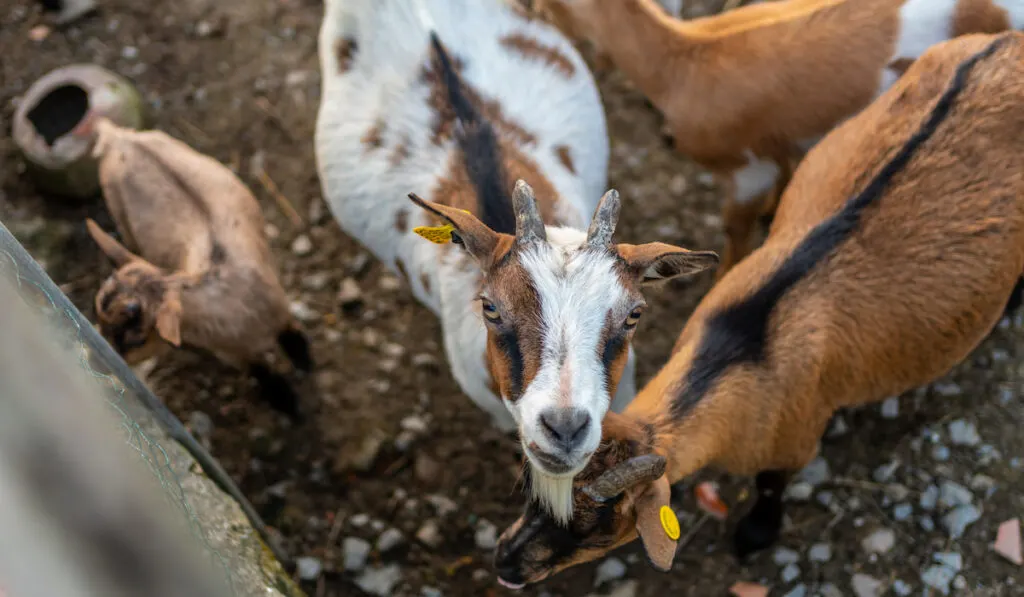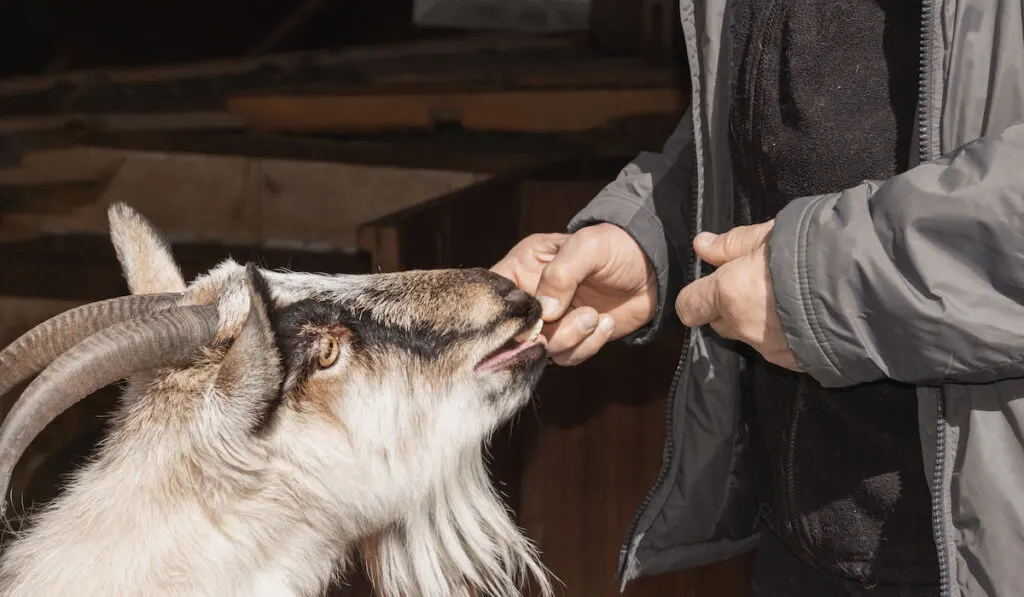We all know how goat poop looks. Goats excrete dry, round pellets. What if your goat’s poop is wet, clumpy, or looks weird? Is something wrong with your goat? Should you be worried about the appearance of your goat’s poop?
Should you be worried if the poop of your goat is clumpy? A clumpy goat poop, when combined with other symptoms can be the sign of some diseases in your goats. If, however, your goat is healthy but has a clumpy poop, it could be because of what you fed the goat or if you switched your goat’s feed.
What goat disease is associated with clumpy poop in goats? How does a change of your goat feed affect the appearance of the poop? What more should you know?

Table of Contents
What Goat Poop Should Look Like
Goat poop should be dark in color, dry, and appear as pellets. With the guide below, you can tell why your goat poop appears the way it is.
- No poop: This is common, but not okay. Maybe the poop clogged in the intestine of the goat. If your goat does not poop in the next 24 hours, contact the vet.
- Meconium: This dark, sticky poop is common in newborn goats and is completely safe.
- Watery Yellow Scours (Diarrhea): This can be caused by too much milk.
- Yellow Grape-like Clusters at 10-20 days old: This is normal as it indicates a maturing digesting system.
- Smelly, Green Diarrhea: This is a sign of coccidiosis. Coccidiosis is discussed later.
- Dark Brown or Black Pellets: This is the normal appearance of goat poop.
- Clumpy Poop in Adult: Not normal and there can be so many reasons that we will discuss later.
(Source)
A clumpy poop of adult goats can mean different things. Lets discuss some of the most common reasons why your goat poop is clumpy.

Reasons Goat Poop is Clumpy and What You Should Do
1. Immediate Change of Goat Feed
This is a common reason your goat poop is clumpy. Remember that goats are ruminants. Ruminants have an organ called a rumen which houses a large population of bacteria. These bacteria help the goats to breakdown food particles that your goats eat.
The thing about these bacteria is that there are different kinds present in the rumen of different goats. The kind of bacteria present in a goats rumen is determined by what the goat eats. If the goat mostly feeds on hay, bacteria that easily ferments hay will be higher. If the goat mostly feeds on processed feed, the bacteria present will be diverse (because processed feed has different ingredients).
If you change what you feed your goat, the bacteria will need time to adjust to the new feed. This period of adjusting can cause your goats not to fully digest their feed. Only a fully digested feed comes out as dry pellets, so your goat poop will look wet and clumpy if the feed is not fully digested.
To change the feed given to a goat, give them little bits of the new feed daily for about 2-3 days (while giving them the old feed). Then increase the quantity of the new feed you give to them daily until you replace all the old feed.
2. Bad Feed
Examples of bad feed for goats are:
- Processed bird feed
- Leaves of tomatoes, tobacco, and potato
- Flesh or any animal product (except goat milk)
Potatoes, tomatoes, and tobacco have phytotoxins that can upset the stomach of your goats. Goats are herbivores and they cannot fully digest meat and animal products, so you should not give them such foods. Processed bird feed is made from animal products such as fish meal, crayfish dust, maggot meal, etc. so bird feed is generally unsafe for goats.
You should not feed these products to your goat. Ask your vet or research on more bad feeds for goats.

3. Coccidiosis
The protozoan coccidian, which causes the coccidiosis disease is the major cause of diarrhea (scours) in goats. Nearly all goats that feed on fresh green leaves from the ground carry this protozoan. The disease is transmitted with the poop of goats.
If a goat has scours, you should isolate the goat so that it does not transmit the protozoan to other goats. You should also contact your vet to treat the goat. The pen of the goat should be cleaned regularly.
4. Too Many Fresh Green Leaves
If it is okay for wild goats to eat green leaves (especially grass), why should your goats not eat too much of them? Well, wild goats are always on the move, so even though some protozoan are present in the leaves, they will not have a complete lifecycle because the goats have moved to a new location with different species of plants.
Your goats are restricted to a few plant species, so it is easy for parasites in the plants to infect them and spread from one goat to the next. Eating too much grass can also affect the appearance of your goats poop.
You should give other types of feed to your goats, not just fresh grass.
5. Goats Eating Anything
So many people believe that goats can digest anything. From metals, plastic bags to papers, people allow goats to eat just about anything. The truth is that the stomach of goats does not digest these kinds of stuff, but goats are always very curious.
If you allow your goats to eat anything, their stomach might get upset, and they will not be able to digest everything they eat, resulting in a weird appearance of their poop.
There are so many reasons why your goat poop can be clumpy, but the reasons above are the most common. Now, if your goats are healthy and have normal poop, what can you do with the poop? Continue reading.
What to Do With Goat Poop
Here are two uses of healthy goat poop:
- Fertilizer: Goat poop, just like cow poop, can make an excellent organic fertilizer. Goat poop used as organic fertilizer does not burn your plants easily like the manure of other animals. Make sure that it is well-rotted.
- Compost: One great thing about goat poop is that it is in pellet form, so it makes your compost pile porous. This allows air to get into your compost pile. An aerated compost pile decomposes quickly.
What will you use the poop for?
Final Thoughts
The normal appearance of goat poop is dry, dark and round like pellets. If your goat poop is clumpy, you should check the reasons and solutions above to guide you.
Sources
- https://www.waldeneffect.org/blog/Goat_manure/
- https://www.mannapro.com/homestead/dealing-with-goat-scours
- https://www.gardeningknowhow.com/composting/manures/goat-manure-fertilizer.htm
- https://groups.google.com/g/alt.goat/c/FgA_v2CZXYM?pli=1
- https://content.ces.ncsu.edu/coccidiosis-the-most-common-cause-of-diarrhea-in-young-goats

April dodson
Tuesday 24th of January 2023
What can I give my nursing nanny for clumpy poop